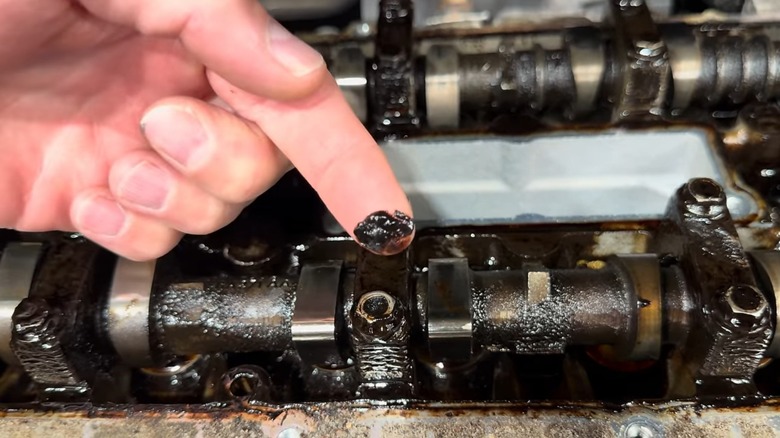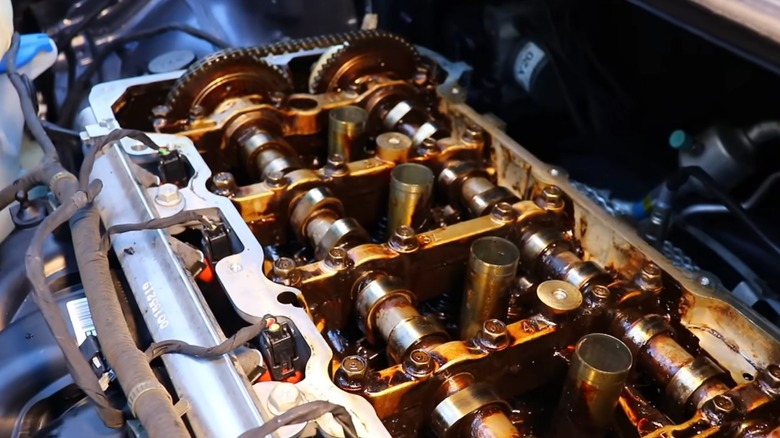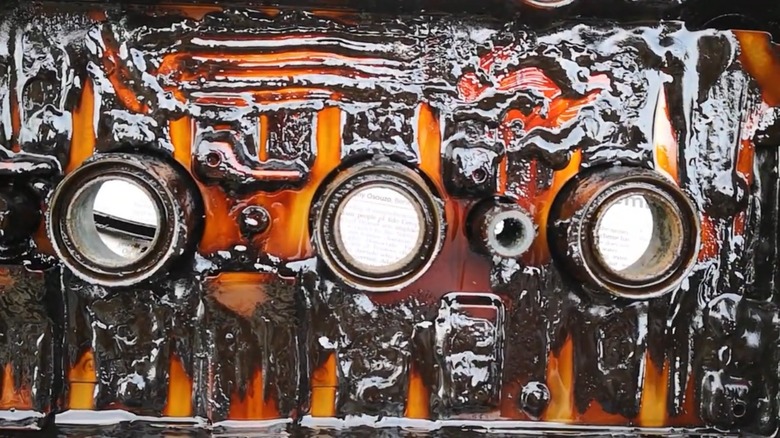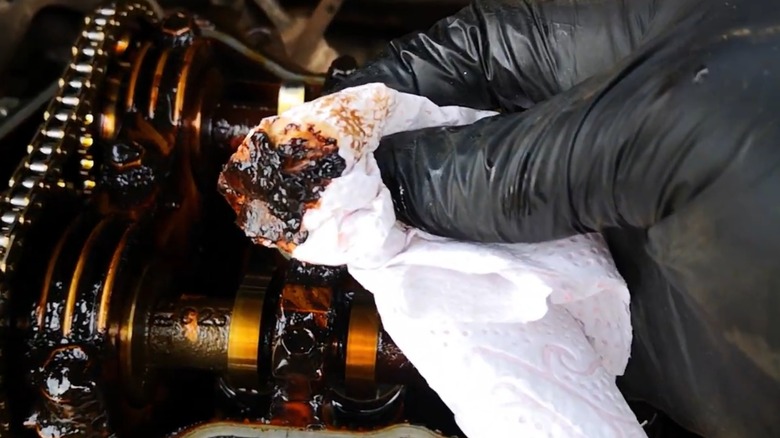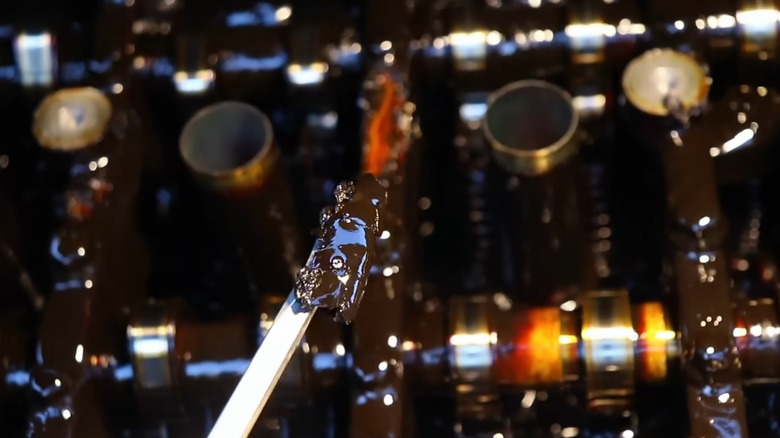What Causes Engine Sludge (And How To Get Rid Of It)
Most people are familiar with the importance of oil for the internal combustion engines that power our modern vehicles. The petroleum-based fluid is designed to provide lubrication to the vast amount of internal moving parts that our engines contain. In addition to providing lubrication, oil also helps prevent overheating issues by impeding the buildup of friction and absorbing excess heat and carrying it away from sensitive components. Oil has an important job, and because of that, it requires regular maintenance.
If you don't maintain your engine oil properly, your car can develop a lot of issues, including engine sludge. Engine sludge — sometimes called oil sludge — is a thick, jelly-like substance that can form inside of your engine if the oil becomes contaminated, or you go too long without replacing it. The tarry sludge can gunk up your engine's internal components, like the camshaft(s), crankshaft, and pistons. It can cause extreme amounts of friction and lead to severe engine damage, including problems serious enough to require a complete rebuild or replacement.
Considering the damage that engine sludge can create, it's a good idea to familiarize yourself with the causes and symptoms and some of the ways to prevent the development of the issue in the first place. As a former professional auto repair technician and a lifelong car enthusiast, I'll break it down for you. Together, we'll explore the common causes of engine sludge, the warning signs, how to get rid of it, and how to prevent it in the first place. Let's dive in.
The primary causes of engine sludge
Engine sludge is caused primarily by the oxidation of oil. As it ages and becomes exposed to contaminants, like oxygen, extreme heat, and metal shavings, motor oil breaks down. If oil is exposed to sufficient amounts of oxygen, high temperatures, or other contaminants, a chemical reaction can take place, transforming the smooth-flowing lubricant into the sticky gunk known as engine sludge.
Fortunately, oil doesn't just turn into engine sludge randomly out of the blue. In most cases, engine sludge forms when drivers fail to keep up with routine oil changes. Your oil replacement interval will depend on factors like your car's make and model and its age, but most vehicles require an oil change at least every 3,000 to 7,500 miles. After that period, the oil can begin to break down and accumulate contaminants. If you go long enough without replacing your oil, your engine may develop sludge.
Besides failing to keep up with routine maintenance, a few other things can cause the buildup of engine sludge. One of the most common secondary causes of engine sludge is frequent driving in heavy traffic or in stop-and-go traffic. Those situations put a lot of extra stress on the engine and can result in excess heat, which is a driving factor in the development of sludge. Other potential and less-common causes of engine sludge include things like emissions control systems malfunctions, a bad head gasket, an improperly installed oil cap, and low-quality oil.
What are the signs of engine sludge?
One of the tricky things about engine sludge is that drivers often don't realize it's inside their engines until it's too late. Once your vehicle has developed a substantial buildup of sludge inside the engine, you're often left with very little options when it comes to repair, and many affected motors require a complete rebuild or replacement. Fortunately, there are a few warning signs that may indicate the presence of engine sludge. If you familiarize yourself with these signs, you may be able to catch the issue before it turns into something even more severe.
One of the most frequently-encountered symptoms of engine sludge is the appearance of dashboard warning lights, like the check engine light (CEL). If your car has an engine sludge problem, it's also common for the oil pressure warning light to appear at the same time as the CEL. Remember, though, that various issues can cause low engine oil pressure and numerous problems can cause your check engine light to appear. If you encounter one or both of these lights, you should visit a professional mechanic for an inspection and diagnosis.
Besides the appearance of dashboard warning lights, your vehicle may display a few additional symptoms if it has an engine sludge problem. Of those additional symptoms, the most common include a drop in gas mileage, severe overheating, and strange sounds coming from the engine bay. Those issues are due largely to the way that sludge gunks up the engine's internals — when that occurs, the engine must work substantially harder to power your car, resulting in a drop in fuel economy, the development of excess heat, and clunking or rattling noises as internal components struggle to move freely and smoothly.
How to get rid of engine sludge
Engine sludge is a serious problem. As such, it may not be surprising to learn that getting rid of oil sludge can be tricky and expensive. Due to the problems it can cause, up to and including complete engine failure, drivers basically have to detect the problem early to have any hope of salvaging their motor.
If you're able to catch engine sludge fast enough, there are some methods you can try to get rid of it. One of the first things you'll need to do is treat the engine with an additive like a detergent or dispersant. These chemicals help break down the sludge, thinning it and allowing it to mix together with the remaining uncompromised oil. For this to work, you'll need to introduce the additive and then start your engine. Allow it to idle for 10 to 15 minutes, or however long is necessary for the engine to warm up. Once the engine is warm, you can turn it off and perform an oil change like normal. Be sure to install a fresh oil filter and refill the engine with the appropriate type of clean oil. Keep in mind that you may need to treat the engine with additives, drain, and refill it with clean oil multiple times to clear out all the sludge.
If you don't detect your engine sludge problem early enough, fixing it can be even more difficult. When the problem is extremely serious, you should avoid starting the engine altogether, meaning that you can't run it to allow an additive to do its work. In severe cases like this, a professional mechanic may have to disassemble the engine for manual cleaning, or you may need a new motor entirely.
How to prevent engine sludge in the first place
Considering all the problems that engine sludge can cause and how tough it can be to eliminate, you're probably wondering how to prevent the development of engine sludge in the first place. The answer is relatively simple: treat your car properly. That means don't slack on routine maintenance like oil changes and coolant flushes and avoid driving your vehicle erratically or irresponsibly. The number one way to prevent the buildup of engine sludge is to change your oil and oil filter regularly, use the correct type and classification of oil, and avoid driving in stop-and-go traffic whenever possible. You may be unable to avoid heavy traffic at all times, especially if you live in a dense urban environment. However, you can practice safe driving habits to prevent the development of excess heat and avoid putting extra stress on the engine.
Additionally, using synthetic motor oil can help prevent engine sludge. That's because synthetic oils are designed to stand up against oxidation and heat better than standard conventional oils — just remember to consult your mechanic or vehicle owner's manual before switching to a new type of oil. Finally, remember to pay attention to your car and its behavior. If you notice any performance problems, the appearance of dashboard warning lights, or any strange sounds, you should visit a professional repair shop for an inspection as soon as possible. Understanding your vehicle and the way it runs can make it easier to notice abnormalities and help you address any issues before they become more serious and costly.
